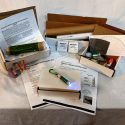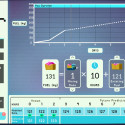Educators publish free workbook to help instructors teach climate change science
The Wisconsin Initiative for Science Literacy at the University of Wisconsin–Madison has published a free climate science workbook intended to provide tools high school and college teachers can use to help their students understand the evidence of global warming and climate change and the human activities that cause them.
The online workbook integrates existing curriculum subjects in science courses — such as heat, light, energy, and acids and bases — into a discussion of the properties and effects of greenhouse gases, especially climate warming and ocean acidification.
“Global warming is the biggest challenge humanity has ever faced,” says Bassam Shakhashiri, UW–Madison professor of chemistry and director of the science literacy center. “Our hope is that all students learn to understand and appreciate the importance of taking responsibility and stewardship for their local communities and the whole planet we inhabit.”
The instructional materials grew out of teacher workshops led by Shakhashiri and the workbook’s principal author, Jerry Bell, emeritus professor at Simmons University in Boston and WISL faculty associate. Those workshops brought Wisconsin high school and college faculty to the UW–Madison campus to prepare them with climate-focused, activity-based lessons for their chemistry, physics and earth science courses.
The classroom activities included in the workshops were designed to engage students more deeply with the scientific concepts common to both the standard curriculum and climate change.
“I have used almost every activity that we did,” says Michelle Kramer, a high school science teacher at Madison Country Day School who attended one of the workshops. “In taking a concept I’d done in a different lab and redoing it in this new activity, it really emphasized this connection (to climate change) as opposed to just emphasizing the science concept.”
Kramer shared some of the lessons she drew from the workshops and has seen that her peers are eager for these materials. “There are people looking, so I think (the workbook) will be very useful,” she says.
Shakhashiri’s and Bell’s goal with the workbook is to exemplify the fit between climate science concepts and existing high school and college curricula, so the connections can be implemented immediately. The workbook is freely available online and will be periodically updated.
“The workbook is a living document,” says Shakhashiri. “It’s going to be changing as we add more activities, as we hear back from people who make suggestions.”
Tags: climate change, education, schools



